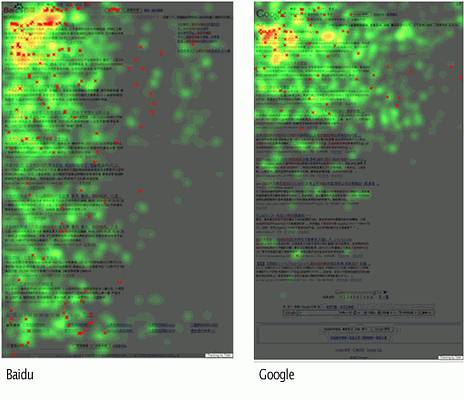A recent eye tracking research from Enquiro looked into Chinese user behavior regarding search results in Baidu and Google. Gord Hotchkiss wrote about this on Search Engine Land.
According to this interesting study there are considerable differences between how users interact with the results. (The research has also looked at the difference between user interaction on Google.com an Google.cn. I’ll focus here more on the differences between Google.cn and Baidu.com). I have one “small but” in regard to this research which I’ll get into at the end.
![]()
The main conclusion of the research is that the success level for a search on Google seems to be higher than on Baidu. Users on Google needed half the time (30 seconds vs. 50 second on Baidu) to find what they were looking for. Most of them also didn’t look beyond the fourth result. In Baidu they scanned the whole page, clicked on more results (results pop-out) and as a result took more time.
One of the differences in the way Chinese users interact with search results is contributed by Enquiro to the fact that the Baidu results page lacks transparency between sponsored and organic listings.
It’s true that there are no background color differences like you have in Google for sponsored results on top of the organic results. Baidu does show these days whether a result is sponsored or not. In how far a user will notice this small tag, I don’t know.
Gord also goes into the question why Chinese users prefer Baidu, while at the same time it seems the results on Baidu are less useful than on Google. He mentions that Chinese users may favor Baidu because it’s a home grown, Chinese search engine.
To a point this may indeed still be a factor although I don’t think that will hold true in the future as the quality of the results will become a more important distinctive factor.
He also regards MP3 search as a significant factor for Baidu’s popularity. This last one is definitely contributing to Baidu’s market share as for a big part Chinese users are still young and like downloading whatever is free.
Another reason that isn’t mentioned here but plays a part I think is the fact that the Google website tends to be slower and at times stalls because of censorship which negatively affects the user experience.
Last time I wrote about research showing that Chinese internet users favored Google results over Baidu results. This study shows that users seem to find faster what they want on Google than on Baidu and that may support the favorism of Google results.
There is one “small but” though which I mentioned in the introduction. I haven’t seen the final Enquiro report and this is just an assumption on my side. If I understand correctly Google’s default setting is that search results are opened in the same window. Baidu search results open (in my experience) by default in a new browser window.
I haven’t seen the final report and as such I don’t know what the default settings of the search engines (especially Google.cn) were in this test. I would love to know this as opening results in a new window versus in the same window could have affected the experience and the way their eyes were tracked.
What else happened in China
Google Servers, Content License and Cache
According to an article from ChinaTechTews Google will move more servers to China and will launch more local products. ChinaTechNews rightly remarks that there may be consequences for moving servers to China, for example having to provide user data to local authorities which may be used to prosecute netizens that have a different opinion. This happened to Yahoo before.
Although I’m not sure whether there is a relation with the fact they will be moving servers, Google is saidto have received their own ICP (Internet Content Provider) license.
 Websites that are hosted in China are obliged by law to have this license. In case they don’t have the license, the visitor of a Chinese hosted website is shown a lovely cartoon. The current license Google is using has been borrowed from a Beijing classified website and on my last check the license number hasn’t changed yet.
Websites that are hosted in China are obliged by law to have this license. In case they don’t have the license, the visitor of a Chinese hosted website is shown a lovely cartoon. The current license Google is using has been borrowed from a Beijing classified website and on my last check the license number hasn’t changed yet.
Google.cn has lost a feature that is part of its search elsewhere. The cache feature has been removed reports Google Blogoscoped, and this happened in the end of April.
The “Cache” feature hasn’t been very useful as long as I can remember as it was blocked by the censors here. The fact that they have disabled it , and I agree with Google Blogoscoped, is a form of self-censorship. It isn’t going to cause much uproar though as the average user won’t use this feature.
What I did notice was that the cache feature has also been disabled for Chinese search results on Google.com, at least when I search from within China. Maybe someone searching from abroad can check whether this also applies there.
Baidu and Online Payments
China Tech Stories picked up the news that Baidu is planning its own online payment system, based on statements from Baidu’s CFO, Shawn Wang. I haven’t read about this elsewhere but it definitely could be an interesting move for Baidu to venture in this field. Currently the online payment market is still very fragmented with the current leader being Alipay from Alibaba.
Technorati and The Chinese Firewall
 Recently photo-sharing website Flickr was blocked in China. Normally a block by the censors doesn’t stir many waves in the mainland but this time some Chinese internet users are pissed off. Having no access to all your own uploaded pictures makes things personal I guess.
Recently photo-sharing website Flickr was blocked in China. Normally a block by the censors doesn’t stir many waves in the mainland but this time some Chinese internet users are pissed off. Having no access to all your own uploaded pictures makes things personal I guess.
Media blog Danwei writes that Keso, a well know Chinese tech blogger has cursed the firewall in one of his posts (in Chinese). Additionally Keso has added a picture of the “Torture the Net Nanny voodoo doll” in his sidebar. The picture used here, including translation is from the Danwei site. If you like, stick a pin into him.
That’s it for this week.
—
Gemme van Hasselt is an Internet Marketing Consultant, living in Shanghai





